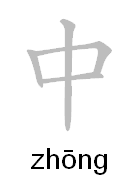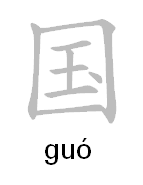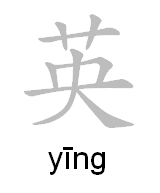Lesson Three: What Country Are You From?
The topic of lesson three is nationalities and countries. The dialogue introduces some new pronouns and lists the names of various countries. There are three new grammar points in this lesson including the introduction of plurals.
Conversation: 你是哪国人?
你是哪国人?
What country are you from?
我是新西兰人。
I am from New Zealand.
他们也是新西兰人吗?
Are they also from New Zealand?
不,他是澳大利亚人,她是德国人。
No, he is Australian, she is German.
| New Words | ||
|---|---|---|
| 哪 | pt. which; what (when expressing appreciation for confirmation, or when giving advice or encouragement) | |
| 国 | n. country, nation, state | |
| 人 | n. person, people, humanity; others, other people | |
| 们 | pt. use to make plural forms of personal pronouns or nouns referring to animate entities | |
| 也 | adv. also, too; (indicating concession) still | |
| 她 | pron. she, her | |
| 新西兰 | n. New Zealand; 新西兰 人 = New Zealander | |
| 澳大利亚 | n. Australia; 澳大利亚 人 = Australian | |
| 德国 | n. Germany; 德国 人 = German |
Correct Usage
As a general rule there are two ways of forming the name of foreign countries in Chinese.
1. The word “country” (国 ) is added to a character whose pronunciation is similar to the name of the country concerned.
- 美国 : America
- 英国 : England
- 法国 : France
- 德国 : Germany
2. A purely phonetic translation is used. Chinese characters are used to replace the sound of the country’s name.
- 爱尔兰 : Ireland
- 意大利 : Italy
| A few examples of country names | ||
|---|---|---|
| 美 国 | America | |
| 澳大利亚 | Australia | |
| 加拿大 | Canada | |
| 中国 | China | |
| 英国 | England | |
| 法国 | France | |
| 德国 | Germany | |
| 印度 | India | |
| 爱尔兰 | Ireland | |
| 意大利 | Italy | |
| 日本 | Japan | |
| 韩国 | Korea | |
| 新西兰 | New Zealand | |
| 巴基斯坦 | Pakistan | |
| 土耳其 | Turkey | |
| 越南 | Viet Nam |
For even more countries, see Free Chinese Lessons list of countries.
Grammar Points
The Adverb 也
The adverb 也 must be placed before the verb that it modifies. It cannot be used without the word on which it depends. For example, 他也是新西兰人。 He is also from New Zealand.
Asking questions with 哪
Like other adjectives or interrogative pronouns, 哪 is
used where the question’s answer should be. For example:
- Q: 你是哪国人?
- A: 我是美国 人。
Using the plural suffix 们
们 is a suffix mainly used to form plural personal pronouns. For
example, 我们, 你们, 他们.
Exercises
Complete the following conversations by filling in the blanks.
- 你是哪国人?
- 我是 _________ 人。
- 你是韩国人吗?
- 我不是 _____________。
- 他是哪国人?
- ______国人。
Writing Exercises
Let’s first review two characters you already know. Putting together 中 and 国 and you have the word China.


Here is the first character for England. You already know the second.

This concludes our third lesson. If things are progressing too quickly for you take the time to go over the previous lessons again. When you’re ready, move onto the next lesson.

March 8, 2015 @ 8:23 pm
Good work you are doing. I never know I can learn the chinese but you have made it more interesting, if only you can add sound for correct pronunciation it would be great.
December 10, 2014 @ 10:44 am
awesome website!! as said before someone else, it would awesome to add some pinyin sounds!! i dont want to unlearn bad pronoun!
February 20, 2014 @ 12:17 am
Really enjoying using this site. The lessons are laid out in an easy to understand format and logical way!
As a suggestion, it would be good to have a feature where the pinyin in displayed when hovering over a Chinese character. This would avoid having to scroll up and down to check if you’re unsure. Also sound files for correct pronunciation would be welcome. I have no idea if what I’m saying is correct!
谢谢。 我是英国人。
February 20, 2014 @ 8:36 pm
你好英国人.
That’s a really excellent suggestion! I’ve quickly added pinyin when hovering over characters. Not every character on the site, but all the exercises and grammar points. Thanks for the great idea!
Still working on sound files for pronunciation.
October 4, 2013 @ 3:10 am
Excellent site..